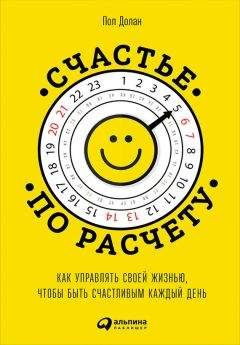Дэниел Гилберт - Спотыкаясь о счастье
112
Jenkins H.M., Ward W.C. Judgment of Contingency Between Responses and Outcomes // Psychological Monographs 79, 1965; Wason P.C. Reasoning About a Rule // Quarterly Journal of Experimental Psychology 20, 1968; Hamilton D.L., Gifford R.K. Illusory Correlation in Interpersonal Perception: A Cognitive Basis of Stereotypic Judgements // Journal of Experimental Psychology 12: 392–407, 1976. См. также: Crocker J. Judgment of Covariation by Social Perceivers // Psychological Bulletin 90: 272–292, 1981; Alloy L.B., Tabachnik N. The Assessment of Covariation by Humans and Animals: The Joint Influence of Prior Expectations and Current Situational Information // Psychological Review 91: 112–149, 1984.
113
Klayman J., Ha Y.W. Confirmation, Disconfirmation and Information in Hypothesis-Testing // Psychological Review 94: 211–228, 1987.
114
Tversky A. Features of Similarity // Psychological Review 84: 327–352, 1977.
115
Shafir E. Choosing Versus Rejecting: Why Some Options Are Both Better and Worse Than Others // Memory – Cognition 21: 546–556, 1993.
116
Wilson T.D. et al. Focalism: A Source of Durability Bias in Affective Forecasting // Journal of Personality and Social Psychology 78: 821–836, 2000.
117
Schkade D.A., Kahneman D. Does Living in California Make People Happy? A Focusing Illusion in Judgments of Life Satisfaction // Psychological Science 9: 340–346, 1998.
118
Lam K.C.H. et al. Cultural Differences in Affective Forecasting: The Role of Focalism // Personality and Social Psychology Bulletin (in press).
119
Menzela P. et al. The Role of Adaptation to Disability and Disease in Health State Valuation: A Preliminary Normative Analysis // Social Science – Medicine 55: 2149–2158, 2002.
120
Turnbull C. The Forest People. – New York: Simon & Schuster, 1961. P. 222.
121
Trope Y., Liberman N. Temporal Construal // Psychological Review 110: 403–421, 2003.
122
Vallacher R.R., Wegner D.M. A Theory of Action Identification. – Hillsdale, N. J.: Lawrence Erlbaum, 1985. P. 61–88.
123
Liberman N., Trope Y. The Role of Feasibility and Desirability Considerations in Near and Distant Future Decisions: A Test of Temporal Construal Theory // Journal of Personality and Social Psychology 75: 5–18, 1998.
124
Robinson M.D., Clore G.L. Episodic and Semantic Knowledge in Emotional Self-Report: Evidence for Two Judgment Processes // Journal of Personality and Social Psychology 83: 198–215, 2002.
125
Eyal T. et al. The Pros and Cons of Temporally Near and Distant Action // Journal of Personality and Social Psychology 86: 781–795, 2004.
126
Newby-Clark I.R., Ross M. Conceiving the Past and Future // Personality and Social Psychological bulletin 29: 807–818, 2003; Construing the Past and Future // Social Cognition 16: 133–150, 1998.
127
Liberman N., Sagristano M., Trope Y. The Effect of Temporal Distance on Level of Mental Construal // Journal of Experimental Social Psychology 38: 523–534, 2002.
128
Ainslie G. Specious Reward: A Behavioral Theory of Impulsiveness and Impulse Control // Psychological Bulletin 82: 463–496, 1975; Ainslie G. Picoeconomics: The Strategic Interaction of Successive Motivational States Within the Person. – Cambridge: Cambridge University Press, 1992.
129
Jowett O. Plato’s Protagoras. – New York: Prentice Hall, 1956.
130
Loewenstein G. Anticipation and the Valuation of Delayed Consumption // Economy Journal 97: 666–684, 1987.
131
McClure S.M. et al. The Grasshopper and the Ant: Separate Neural Systems Value Immediate and Delayed Monetary Rewards // Science (in Press).
132
Newcomb S.A. Side-Lights on Astronomy. – New York: Harper & Brothers, 1906. P. 355.
133
Wright W. Speech to the Aero Club of France // The Papers of Wilbur and Orville Wright, ed. M. McFarland. – New York: McGraw-Hill, 1908. P. 934.
134
Goethals G.R., Reckman R.F. The Perception of Consistency in Attitudes // Journal of Experimental Social Psychology 9: 491–501, 1973.
135
McFarland C., Ross M. The Relation Between Current Impressions and Memories of Self and Dating Partners // Personality and Social Psychology Bulletin 13: 228–238, 1987.
136
Safer M.A., Levine J., Drapalski A.L. Distortion in Memory for Emotions: The Contributions of Personality and Post-Event Knowledge // Personality and Social Psychology Bulletin 28: 1495–1507, 2002.
137
Eich E. et al. Memory for Pain: Relation Between Past and Present Pain Intensity // Pain 23: 375–380, 1985.
138
Collins L.N. et al. Agreement Between Retrospective Accounts of Substance Use and Earlier Reported Substance Use // Applied Psychological Measurement 9: 301–309, 1985; Markus G.B. Stability and Change in Political Attitudes: Observe, Recall and ‘Explain’ // Political Behavior 8: 21–44, 1986; Offer D. et al. The Altering of Reported Experiences // Journal of American Academy of Child and Adolescent Psychiatry 39: 735–742, 2000.
139
Safer M.A., Bonanno G.A., Field N.P. ‘It Was Never That Bad’: Biased Recall of Grief and Long-Term Adjustment to the Death of a Spouse // Memory 9: 195–204, 2001.
140
Ross M. Relation of Implicit Theories to the Construction of Personal Histories // Psychological Review 96: 341–357, 1989; Levine L.J., Safer M.A. Sources of Bias in Memory for Emotions // Current Directions in Psychological Science 11: 169–173, 2002.
141
Levine L.J. Reconstructing Memory for Emotions // Journal of Experimental Psychology: General 126: 165–177, 1997.
142
Loewenstein G.F. Out of Control: Visceral Influences on Behavior // Organizational Behavior and Human Decision Processes 65: 272–292, 1996; Loewenstein G.F., O’Donoghue T., Rabin M. Projection Bias in Predicting Future Utility // Quarterly Journal of Economics 118: 1209–1248, 2002; Loewenstein G., Angner E. Predicting and Indulging Changing Preferences // Time and Decision, eds. G. Loewenstein, D. Read and R.F. Baumeister. – New York: Russell Sage Foundation, 2003. P. 351–391; van Boven L., Dunning D., Loewenstein G.F. Egocentric Empathy Gaps Between Owners and Buyers: Misperceptions of the Endowment Effect // Journal of Personality and Social Psychology 79: 66–76, 2000.
143
Nisbett R.E., Kanouse D.E. Obesity, Food Deprivation and Supermarket Shopping Behavior // Journal of Personality and Social Psychology 12: 289–294, 1969; Read D., van Leeuwen B. Predicting Hunger: The Effects of Appetite and Delay on Choice // Organizational Behavior and Human Decision Processes 76: 189–205, 1998.
144
Loewenstein G.F., Prelec D., Shatto C. Hot/Gold intrapersonal Empathy Gaps and the Under-prediction of Curiosity (неопубликованный материал, Carnegie-Mellon University, 1998, упомянут в: Loewenstein G.F. The Psychology of Curiosity: A Review and Reinterpretation // Psychological Bulletin 116: 75–98, 1994).
145
Kosslyn M.S. et al. The Role of Area 17 in Visual Imagery: Convergent Evidence from PET and rTMS // Science 284: 167–170, 1999.
146
McGuire P.K., Shah G.M.S., Murray R.M. Increased Blood Flow in Broca’s Area During Auditory Hallucinations in Schizophrenia // Lancet 342: 703–706, 1993.
147
Kavanagh D.J., Andrade J., May J. Imaginary Relish and Exquisite Torture: The Elaborated Intrusion Theory of Desire // Psychological Review 112: 446–467, 2005.
148
Anderson A.K., Phelps E.A. Lesions of the Human Amygdala Impair Enhanced Perception of Emotionally Salient Events // Nature 411: 305–309, 2001; Phelps E.A. et al. Activation of the Left Amygdala to a Cognitive Representation of Fear // Nature Neuroscience 4: 437–441, 2001; Breiter H.C. et al. Functional Imaging of Neural Responses to Expectancy and Experience of Monetary Gains and Losses // Neuron 30, 2001.
149
См. также: Atance C.M., O’Neill D.K. Episodic Future Thinking // Trends in Cognitive Sciences 5: 533–539, 2001.
150
Wilson T.D. et al. Introspecting About Reasons Can Reduce Post-choice Satisfaction // Personality and Social Psychology Bulletin 19: 331–339, 1993; Wilson T.D., Schooler J.W. Thinking Too Much: Introspection Can Reduce the Quality of Preferences and Decisions // Journal of Personality and Social Psychology 60: 181–192, 1991.
151
DeWall C.N., Baumeister R.F. Alone but Feeling No Pain: Effects of Social Exclusion on Physical Pain Tolerance and Pain Threshold, Affective Forecasting and Interpersonal Empathy (неопубликованный материал, Florida State University, 2005).
152
Reisberg D. et al. ‘Enacted’ Auditory Images Are Ambiguous; ‘Pure’ Auditory Images Are Not // Quarterly Journal of Experimental Psychology: Human Experimental Psychology 41: 619–641, 1989.
153
Умные психологи конструировали некоторые необычные обстоятельства, которые предоставляли исключения из этого правила; см.: Perky C.W. An Experimental Study of Imagination // American Journal of Psychology 21: 422–452, 1910. Стоит заметить также, что, хотя мы почти всегда можем отличить то, что видим, от того, что воображаем, мы не всегда отличаем то, что видели, от того, что воображали; см.: Johnson M.K., Raye C.L. Reality Monitoring // Psychological Review 88: 67–85, 1981.
154
Schwarz N., Clore G.L. Mood, Misattribution and Judgments of Well-Being: Informative and Directive Functions of Affective States // Journal of Personality and Social Psychology 45: 513–523, 1983.
155
Van Boven L., Loewenstein G. Social Projection of Transient Drive States // Personality and Social Psychology Bulletin 29: 1159–1168.
156
MacLeod A.K., Cropley M.L. Anxiety, Depression and the Anticipation of Future Positive and Negative Experiences // Journal of Abnormal Psychology 105: 286–289, 1996.
157
Johnson E.J., Tversky A. Affect, Generalization and the Perception of Risk // Journal of Personality and Social Psychology 45: 20–31, 1983; DeSteno D. et al. Beyond Valence in the Perception of Likelihood: The Role of Emotion Specificity // Journal of Personality and Social Psychology 78: 397–416, 2000.
158
Hegarty M. Mechanical Reasoning by Mental Stimulation // Trends in Cognitive Science, 8: 280–285, 2004.
159
Gentner D., Imai M., Boroditsky L. As Time Goes by: Evidence for Two Systems in Processing Space Time Metaphors // Language and Cognitive Processes 17: 537–565, 2002; Boroditsky L. Metaphoric Structuring: Understanding Time Through Spatial Metaphor // Cognition 75: 1–28, 2000.
160
Tversky A., Kugelmass S., Winter A. Cross-Cultural and Developmental Trends in Graphic Productions // Cognitive Psychology 23: 515–557, 1991.
161
Boroditsky L. Does Language Shape Thought? Mandarin and English Speakers’ Conceptions of Time // Cognitive Psychology 43: 1–22, 2001.
162
Ratner R.K., Kahn B.E., Kahneman D. Choosing Less-Preferred Experiences for the Sake of Variety // Journal of Consumer Research 26: 1–15, 1999.
163
Read D., Loewenstein G.F. Diversification Bias: Explaining the Discrepancy in Variety Seeking Between Combined and Separated Choices // Journal of Experimental Psychology: Applied 1: 34–49, 1995; Simonson I. The Effect of Purchase Quantity and Timing on Variety-Seeking Behavior // Journal of Marketing Research 27: 150–162, 1990.
164
Wilson T.D., Gilbert D.T. Making Sense: A Model of Affective Adaptation (неопубликованный материал, University of Virginia, 2005).
165
Gilbert D.T. Inferential Correction // Heuristics and Biases: The Psychology of Intuitive Judgment, eds. T. Gilovich, D.W. Griffin and D. Kahneman. – Cambridge: Cambridge University Press, 2002. P. 167–184.
166
Tversky A., Kahneman D. Judgment Under Uncertainty: Heuristics and Biases // Science 185: 1124–1131, 1974.
167
Epley N., Gilovich T. Putting Adjustment Back in the Anchoring and Adjustment Heuristic: Differential Processing of Self-Generated and Experimenter-Provided Anchors // Psychological Science 12: 391–396, 2001.
168
Gilbert D.T. Gill M.J., Wilson T.D. The Future Is Now: Temporal Correction in Affective Forecasting // Organizational Behavior and Human Decision Processes 88: 430–444, 2002.
169
См. также: Ebert J.E.J. The Role of Cognitive Resources in the Valuation of Near and Far Future Events // Acta Psychologica 108: 155–171, 2001.
170
Loewenstein G.F., Prelec D. Preferences for Sequences of Outcomes // Psychological Review 100: 91–108, 1993.
171
Kahneman D., Tversky A. Prospect Theory: An Analysis of Decision Under Risk // Econometrica 47: 263–291, 1979.
172
Pratt J.W., Wise D.A., Zeckhauser R. Price Differences in Almost Competitive Markets // Quarterly Journal of Economics 93: 189–211, 1979; Tversky A., Kahneman D. The Framing of Decisions and Psychology of Choice // Science 211: 453–458, 1981; Thaler R.H. Toward to Positive Theory of Consumer Choice // Journal of Economic Behavior and Organization 1: 39–60, 1980.
173




